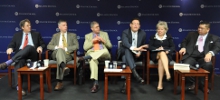
The Atlantic Council’s Michael S. Ansari Africa Center hosted a discussion on ‘Managing Societal Fault Lines in Twenty-First Century Africa.”
The panel was introduced by Ansari Center director J. Peter Pham and moderated by Mary Carlin Yates, former Special Assistant to the President and Senior Director for Africa on the National Security Staff. Other speakers included Jeffrey Herbst, President of Colgate University; Greg Mills, Director of the Johannesburg, South Africa-based Brenthurst Foundation; Joel D. Barkan, Senior Associate in the Africa Program at the Center for Strategic and International Studies; and Peter M. Lewis, Associate Professor and Director of the African Studies Program at the Paul H. Nitze School of Advanced International Studies of the Johns Hopkins University.
The panelists were contributors to the recently published volume, On the Fault Line: Managing Tensions and Divisions within Societies, edited by Herbst, Mills, and Terence McNamee. The book has been hailed as “the seminal work” by former Secretary of State Henry Kissinger and “invaluable” by former South African President and Nobel Laureate F.W. De Clarke. Pham wrote the chapter on “Somalia and Somaliland: State Building amid the Ruins,” one of seven African case stories in the volume.
The panel discussed the findings from the case studies of Nigeria, Uganda, Kenya, Tanzania, Somalia and Somaliland, and South Africa, and the lessons to be gleaned from the experience of states which have made significant progress towards successfully managing their fault lines as well as those which, having failed to do so, have been torn by violence.

